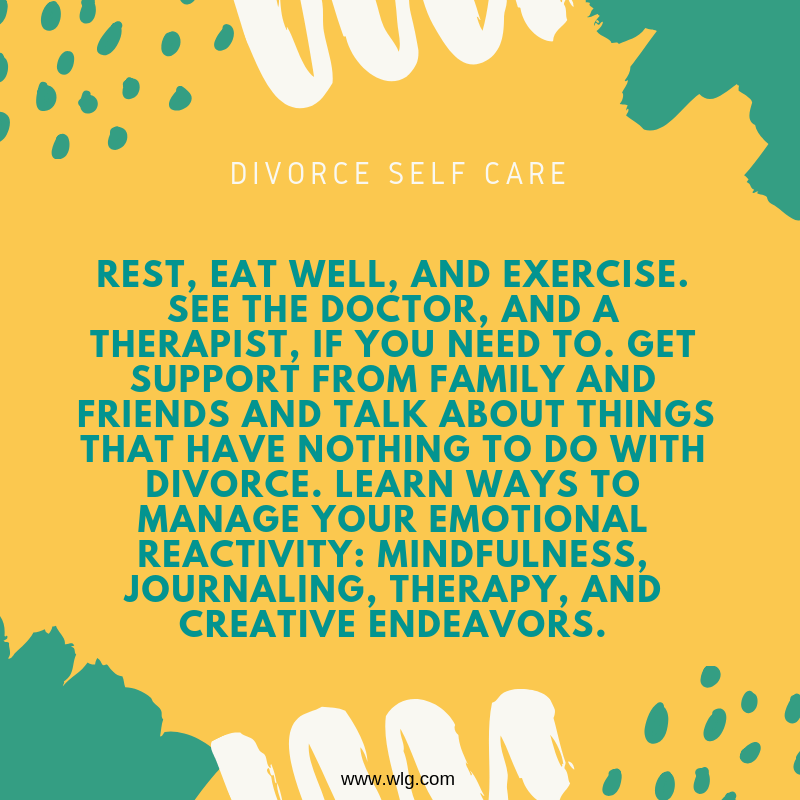Surviving High-Conflict Divorce: 5 Coping Strategies

High-conflict divorce feels like living in an emotional war zone. Relentless legal entanglements, hostile communication, and combative attempts at co-parenting can overload your stress response system and put you in a near constant state of hyperarousal. You’re always waiting for the next bomb to go off, and it seems like one always does.
With all this stress, high conflict divorce can put your mental and physical health at risk. Before it can, take back control with these five key coping skills and strategies.
Surviving High-Conflict Divorce: 5 Ways to Keep Conflict in Check
High-conflict exes are essentially addicted to anger. They get their “fix” by attacking you via public outbursts and nasty emails and texts. This reign of terror keeps you psychologically engaged with your ex. Because any communication with your ex turns antagonistic quickly, you need to limit contact as much as possible. You can do this by:
Responding to emails and texts no more than once a day. One thing you can do right now is press pause on responding to hostile email from your ex. Replying to every nasty email or text your ex sends you will just keep the fight going because they love the hit of adrenaline it gives them. Don’t fall for your ex’s manufactured urgency. Unless there is a true emergency and/or an issue involving your child that needs immediate attention, your ex can wait 24 hours before you write back.
Arrange curbside or school drop-offs for custody exchanges. The less face-to-face contact, the better. Avoiding real-time interactions will minimize opportunities for conflict, and shelter your children from drama. Your ex can pick your child up from school when it’s their turn for parenting time, or if your child is old enough, your child can walk to the parent’s car parked in the driveway or at the curb. One other way to make drops off less contentious is to plan custody swaps for a public place — like your local public library. Many parents caught up in high conflict divorce have these terms spelled out in their custody agreements to help make them stick.
Have separate birthday parties and parent-teacher conferences. Planning your child’s birthday party together requires an amicable co-parenting relationship. If you don’t have one, then don’t force a birthday party on your child that you know (and dread) will result in tension and palpable stress. In this case, separate celebrations can help your child’s birthday remain a happy birthday. Attending parent-teacher conferences together is just another occasion for disagreement, especially if your child is having academic problems. Talk to your child’s teachers or school principal or guidance counselor about the need for separate conferences. You may feel sad that you have to do child-related activities separately, but minimizing contact is more important. [For more tips, read our blog: When Co-Parenting Doesn’t Work, Try Parallel Parenting.]
Implement a low-conflict communication protocol. Learning how to communicate in a way that defuses conflict is one of the single most important steps to take to manage your ugly divorce. No matter how nasty your ex gets, resist the urge to retaliate and follow these guidelines when writing (or speaking): be brief (shorter is always better), informative (no opinions, lectures, or feelings), neutral in tone (no sarcasm), and firm (set a limit and stick to it). This communication protocol won’t change your ex’s aggressive personality, but it will give him or her less incentive to fight with you. Pro tip: You may want to scale back to text messages only at first when you have something to say. In some high-conflict divorces, the agreed upon method of communication is written directly into the divorce settlement.
Focus on what you can control. Trying to control what your ex thinks or does just keeps you engaged. Practice radical acceptance: this person is in your life and you’re powerless to change him or her. What you do have power over is your own behavior, so focus on choosing your actions wisely. Get enough rest, eat well, and exercise. See the doctor, and a therapist, if you need to. Get support from family and friends and talk about things that have nothing to do with divorce. Learn ways to manage your emotional reactivity: mindfulness, journaling, therapy, and creative endeavors.
Following these steps will help you calm your nervous system, detach emotionally from your ex, and move forward with your life.
Is your life hampered by the mind games of a high conflict ex? Are visitation swaps tense? Want to learn about legal measures to lower conflict in your divorce? Surviving high-conflict divorce is possible! Start safeguarding your future today. Schedule your confidential attorney consultation by calling us at 888-888-0919, or please click the button below.
Schedule an Initial Consultation



